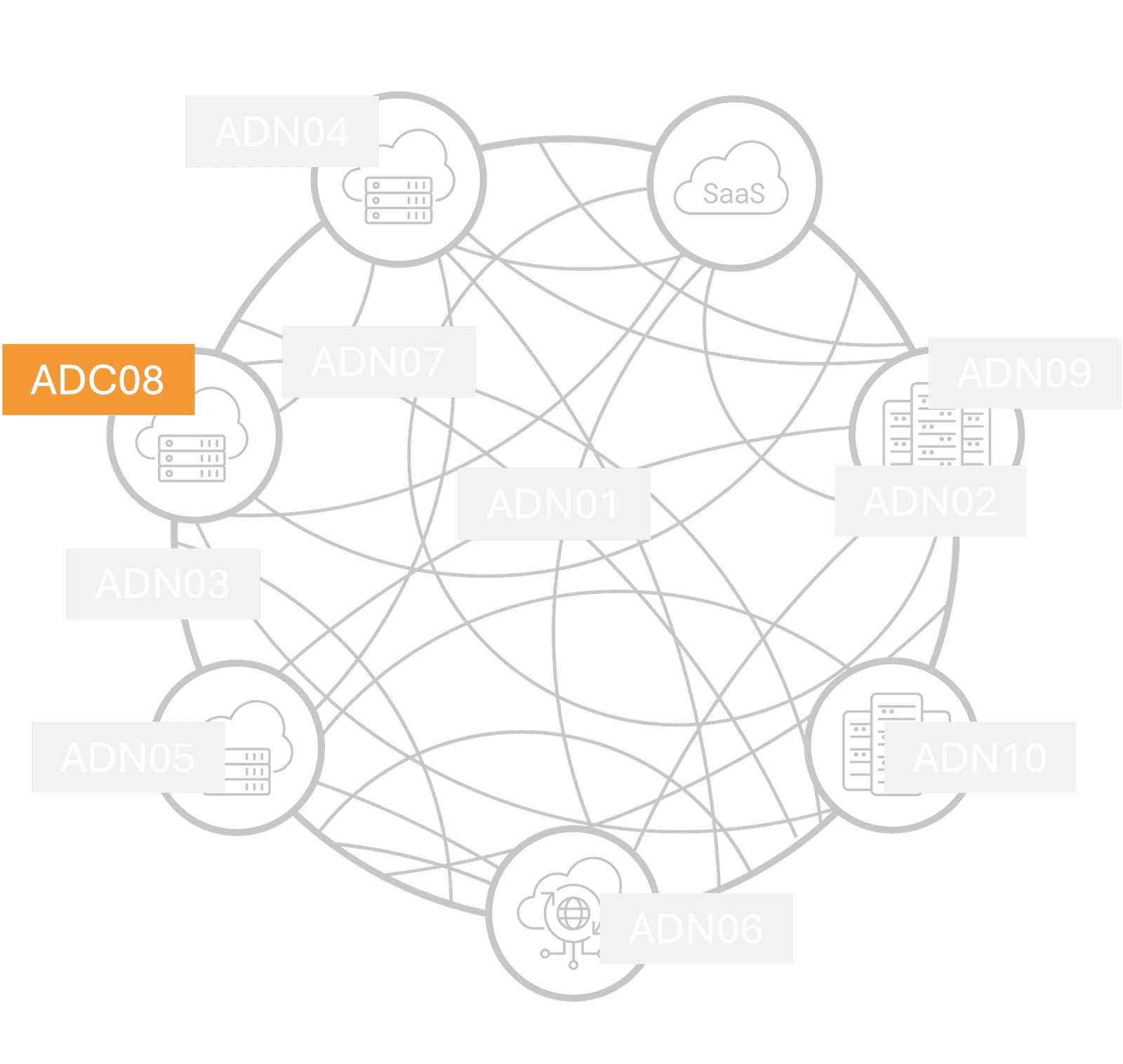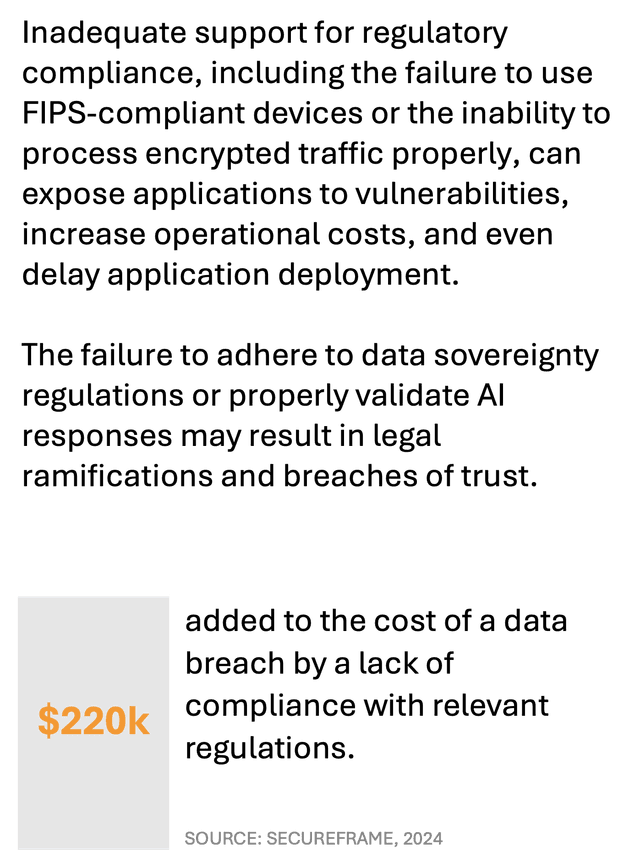As governments worldwide enforce stricter laws on data sovereignty, security, and privacy, regulatory compliance has become essential for organizations handling sensitive data. Failing to meet these regulations not only exposes applications to security vulnerabilities but also introduces performance bottlenecks and scalability constraints. These challenges are particularly pronounced in AI-driven applications, which often process large volumes of personal and sensitive data.


Consequences of a Lack of Security and Regulatory Compliance
Impact on Performance
Compliance requirements, especially those related to data localization, can lead to performance bottlenecks by limiting data access and transfer speeds. Applications that are not optimized for regional compliance often face latency issues, as data requests must be processed within specific geographic boundaries. In a recent survey, 36% of companies reported performance issues due to compliance requirements, with data localization laws contributing to delays in data routing and access management.
Additionally, compliance-related security measures, such as encryption, can introduce further latency if they are not properly managed. For example, inefficient encryption processes add computational overhead, slowing down data transfer and processing times. This is especially problematic for AI applications that rely on real-time analytics, where delays directly impact user experience.
Impact on Availability
Availability is significantly affected by inadequate compliance with security regulations, as breaches or unauthorized access can lead to downtime and system outages. In cases where applications lack proper encryption or are not protected by robust security protocols, they become vulnerable to cyberattacks. These attacks often force systems offline for repairs and investigations, leading to service disruptions. Additionally, non-compliance with data sovereignty laws can lead to forced data access restrictions or infrastructure modifications to meet regional regulations.
For instance, the General Data Protection Regulation (GDPR) in Europe mandates that data be stored within the EU. If applications are not designed with such compliance in mind, they may require unplanned maintenance and reconfiguration, which reduces uptime and impacts reliability. Compliance-related disruptions can lead to reduced availability, particularly for users in regions with stringent data handling requirements.
Impact on Scalability
Data sovereignty requirements, which dictate where and how data can be stored and processed, directly impact scalability by restricting the infrastructure’s ability to expand across regions. If data must remain within a specific jurisdiction, organizations may need to deploy additional resources within that area to comply with the regulations. This increases operational complexity and costs, as resources must often be duplicated in multiple regions to maintain compliance. AI applications that rely on large datasets face further scalability constraints due to these restrictions.
For example, when data from different regions must be segmented, it becomes challenging to implement centralized data processing models, which are critical for training AI models effectively. This forced data segmentation leads to data silos, reducing scalability and making it difficult to support growing data volumes and global expansion.
Impact on Operational Efficiency
Non-compliance with security and regulatory requirements impacts operational efficiency by increasing overhead and resource requirements. When applications do not adhere to compliance standards, IT teams often need to allocate additional time for manual audits, reconfigurations, and security monitoring. These tasks not only increase operational costs but also divert resources from other critical functions.
Moreover, organizations that fail to meet compliance standards may face fines, legal penalties, and reputational damage, further affecting the organization’s bottom line. Adopting automated compliance tools and robust security practices can reduce manual intervention, optimize resource allocation, and streamline operations, allowing IT teams to focus on strategic tasks rather than constant regulatory adjustments.
Best Practices for Mitigating Security and Compliance Risks
To address these challenges, organizations should prioritize encryption, utilize FIPS-compliant devices, and implement automated compliance checks. These measures strengthen application delivery by ensuring data security, improving availability, and supporting scalability across different regions.
Encryption and FIPS-Compliant Devices
Encryption is crucial for protecting sensitive data in transit and at rest. By employing strong encryption protocols, organizations prevent unauthorized access to sensitive information, safeguarding both user privacy and compliance with data protection laws.
Federal Information Processing Standard (FIPS)-compliant devices further enhance security by meeting federal standards for encryption, making them suitable for applications that handle regulated data, such as healthcare and government information. FIPS compliance ensures that applications adhere to strict security requirements, which minimizes the risk of breaches and compliance-related shutdowns, improving both availability and reliability.
Automated Compliance Checks
Automated compliance checks streamline the process of adhering to data sovereignty and regulatory requirements by continuously verifying data residency and access controls. Tools can offer automated policy enforcement, allowing organizations to monitor compliance in real time and quickly identify potential violations. Automated compliance checks reduce the need for manual audits, freeing up resources and ensuring that compliance standards are consistently met.
Additionally, automated monitoring solutions provide real-time alerts for potential security threats, enabling IT teams to respond swiftly and maintain operational efficiency.
Conclusion
The lack of security and regulatory compliance poses significant risks to application performance, availability, scalability, and operational efficiency. By implementing strong encryption, utilizing FIPS-compliant devices, and adopting automated compliance tools, organizations can address these risks and support secure, scalable, and compliant application delivery.
Prioritizing security and regulatory compliance not only protects sensitive data but also enhances application resilience, enabling organizations to deliver reliable services in an increasingly regulated digital landscape. Investing in these strategies is essential for maintaining high performance, availability, and scalability while ensuring user trust and legal compliance across hybrid multicloud environments.